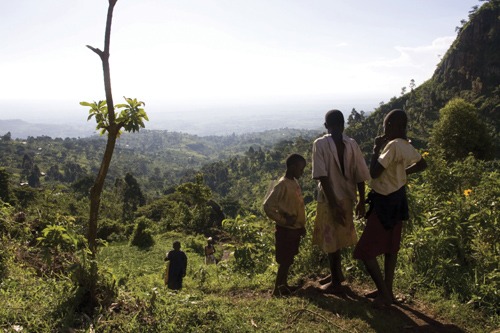
This article is a preview from the Winter 2015 edition of New Humanist. You can find out more and subscribe here.
Heaven and hell are no more and God’s final judgement will never come; God, the creator of generations and everything on earth, is gone for ever. The news about the death of Jehovah Wanyonyi, leader of the Lost Israelites Church, has shocked his followers in Kenya and Uganda. His death remains a mystery to his closest acolytes, despite the Kenyan government’s confirmation that it issued a burial permit.
“Jehovah our god is alive, and he will never die, not even for a single day like Jesus,” Eliab Makokha, who held the position of “Angel” in Wanyonyi’s sect, told me. “The ‘death’ of our god is a creation of the media, how can the giver of life die?”
But Christopher Wanjau, the deputy commissioner for Uasin Gishu County in Kenya’s Rift Valley, home (until recently) to Wanyonyi, begs to differ. “It is true Wanyonyi died of malaria at his home,” he said. “The area chief Daniel Busienei issued a permit to Jehovah’s son Nelson Wanyoni to transfer the body to Cherangani hospital in Kitale.”
As the days passed, with Jehovah absent from his throne and news of his death spreading like bush fire, the Church’s followers sent a team to Bungoma County and eastern Uganda to search for his grave. Those I spoke to believe Wanyonyi left 70 wives, 500 children and over 1,000 grandchildren. He was born in 1925 and founded the Lost Israelites Church in 1956. Four years later, Wanyonyi declared himself a true God of the Bible, claiming he possessed the powers of life and death, and the ability to heal all wounds and sicknesses.
His thousands of followers – mainly illiterate rural dwellers in Uganda and Kenya – believed he was the immortal God, and that the future of all creation depended on him. At one time he threatened to destroy the present sinful generation and replace it with a better one, obedient to him. The cult is organised into a strict hierarchy. Wanyonyi, naturally, was the highest authority. Then comes the Angel, who announces the wishes and revelations of God, and the Prophets, whose duties include presenting followers’ problems to God. Two high priests were responsible for collecting offerings, such as food. They were also the ones who decided if Jehovah needed additional wives.
In the early 1980s Wanyonyi lived in Bungoma, near Kenya’s border with Uganda, and drew most of his supporters from his own Luhya tribe. Hearing that he could cure all disease, the people donated their land and livestock to Wanyonyi, or sold it and gave him the cash. He also married most of their daughters.
But despite his claims, his followers fell victim to disease – malaria, typhoid, cholera and meningitis. Many died, because Jehovah did not allow them to go to hospital for treatment, in addition to forbidding their children to attend school. Eventually, the people of Bungoma turned against him. They burned his houses and chased him and his family out of the county. Those who had given him their land took it back, as others sought help from the government to retrieve their land. Wanyonyi fled with his family and a small number of followers to the neighbouring Mount Elgon district. Here he was welcomed, given more land and livestock, and new followers joined the sect as he added more wives. While in Elgon, Wanyonyi predicted that the end of the world would come in 1995; then again in 2000; and again in 2002. His followers in Elgon also noticed that the man did not appear to have the divine powers he claimed. They, too, chased Wanyonyi away.
That is how Wanyonyi came to settle at Chemororoch village, in Uasin Gishu, where he died. As befits a deity, his daily life was simple. He would wake at 6am, wash his face, and take his breakfast – tea with or without a loaf of bread or millet porridge, whichever was available. After breakfast he would put on his godly robes – red, because that was the colour of God, he claimed – and then move to his throne in the sitting room to wait for visitors to bring him gifts and have their prayers answered. The throne was a red chair, engraved with the word “Jehovah”.
He only took a shower once or twice a week, due to a lack of water in the village. He never worked and only came out of his throne room (a grass-roofed hut) once or twice a day to take care of his divine duties in the latrine. He went to bed at 9pm. During the day, one of his young wives remained in the homestead to take care of him. Sura was most commonly on duty, while the others joined the prophet and priests to look for casual jobs at local farms to earn something to feed their leader. On Saturdays, the sect’s holy day, Jehovah would appear to his followers in public. They sang, danced, marched and praised him, as they prayed that he would forgive and bless them. “There has never been and there will be no God, other than him,” Sura told me.
Wanyonyi was a poor man. “My children are suffering, and they sometimes sleep hungry,” he acknowledged. “I predicted all this in my book [the Bible], as signs of the last days. Let the people see them, because the day of my judgement is drawing closer. I have not come to make money, but to redeem my people, and that is why I’m poor.”
But Wanyonyi is not in the heaven he claimed to have created. Jehovah was not immortal.

